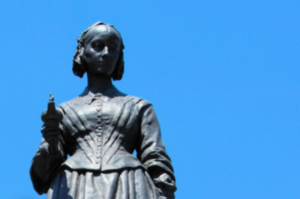 Florence Nightingale made it her life’s work to care for others and improve hygiene practices within hospitals. In late 1854, Florence received a letter asking her to organize a corps of nurses to tend to the sick soldiers in the Crimea. Nightingale rose to her calling and quickly assembled a team of nurses to sail with her to Crimea.
Florence Nightingale made it her life’s work to care for others and improve hygiene practices within hospitals. In late 1854, Florence received a letter asking her to organize a corps of nurses to tend to the sick soldiers in the Crimea. Nightingale rose to her calling and quickly assembled a team of nurses to sail with her to Crimea.
Upon arrival, she saw how horrid the sanitary conditions were at the hospital. She immediately acted by gathering patients to help scrub the inside of the hospital from floor to ceiling. Nightingale herself spent every waking minute caring for the soldiers. In the evenings she moved through the dark hallways carrying a lamp while making her rounds, ministering to patient after patient. The soldiers, who were both moved and comforted by her endless supply of compassion, took to calling her “the Lady with the Lamp.” Others simply called her “the Angel of the Crimea.” Her work reduced the hospital’s death rate by two-thirds.
Based on her observations in the Crimea, Florence wrote Notes on Matters Affecting the Health, Efficiency and Hospital Administration of the British Army, which was an 830-page report analyzing her experience and proposing reforms for other military hospitals operating under poor conditions.
Once she returned back home, Florence received a large monetary prize which she decided to use to further her cause. In 1860, she funded the establishment of St. Thomas’ Hospital, and within it, the Nightingale Training School for Nurses. She ultimately became a figure of public admiration.
*information received from the Florence Nightingale story through history.com.




